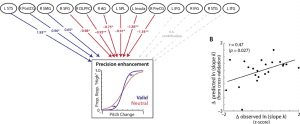Attention lets us focus our limited cognitive resources on behaviorally important information. Less obvious is that attention also helps us to hold information in memory with high precision. But how does the brain implement this directed attention to memory, and what behavioural benefits does it yield for us humans?
Former postdoc Sung-Joo Lim (now at Binghamton University), Jonas Obleser, and a team of collaborators from Oldenburg (Christiane Thiel) and Leipzig (Bernhard Sehm, Lorenz Deserno, and Jöran Lepsien) have now a new article on this old problem, to appear in NeuroImage.
Using the changes in brain blood oxygenation as measured with fMRI, this study demonstrates that attention enables memory maintenance of speech sound information across multiple brain regions. A speech-sensitive brain region in the temporal lobe (the left superior temporal sulcus) contributes the most in predicting the individual gain in recall precision of auditory objects from memory. This study highlights that functionally discrete brain regions work together in maintaining and attentionally enhancing working memory information, but they exert differental influences depending on their functional specializations.
The full article is now available here.

